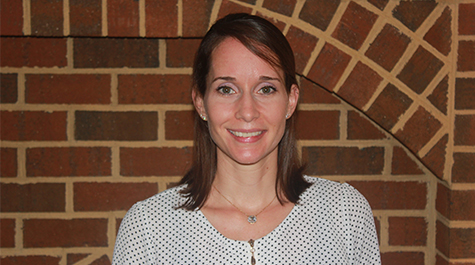Counseling alumna builds trauma-informed communities one day at a time
Grabowski worked towards licensure as a licensed professional counselor by serving as an intensive in-home counselor, then spent another three years at the Middle Peninsula Northern Neck Community Services Board (CSB) before moving up to intensive in-home coordinator at the same agency. In her current role, she oversees intensive in-home services (with three full-time in-home therapists, two part-time in-home therapists, and an ongoing search for another full-time therapist), manages the system of care grant the CSB received from the Virginia Department of Behavioral Health and Developmental Services, supervises counselors for licensure, and provides internal and external trainings.
In addition to all those responsibilities, Grabowski has become a sought-after speaker on the topic of trauma-informed systems. Her advocacy now comes after years of research into the implications of early trauma for children and families, and the ways in which both the children and the systems around them can learn to work more effectively together.
“The population I’ve worked with for the past 12 years is one that people call an at-risk population. These are the kids everyone is worried will hurt themselves or someone else,” she explained. “All the pressure was on me, the therapist, to help these children.”
Her training and instincts told her that there was more to each child’s story. She learned as much as she could about the seminal Adverse Childhood Events (ACE) study conducted by Kaiser Permanente in the late 1990s. The researchers demonstrated that each additional adverse childhood event increased the risk of an individual experiencing behavioral difficulties, depression, suicidality, substance abuse, incarceration, poor health outcomes, and lack of success in school or work. The ACE study tracked the impact of 10 adverse childhood events including emotional, sexual and physical abuse; neglect; parental divorce or separation; witnessing violence in the home; incarceration of a parent; and the suicide or death of a loved one. Through experience and research, Grabowski quickly came to understand that complex trauma, sometimes occurring as early as infancy, often explained how children came to behave as they did – and that talk therapy alone would likely not improve the behaviors that have led them into counseling.
“The behavior they have serves a function,” she said. “The behavior once kept them safe. They lack the knowledge, skills, and resources to make different choices. It’s going to take all of us to build trust, create a system that supports them, and help them learn to do something different.”
At the same time, she said, adults who are working with or caring for children may be unaware of both how trauma impacts youth, and the roots of their own response to children’s behavior. Educating professionals working in systems such as schools, courts, mental health providers, and medical care about the impact of ACEs became a priority.
Part of her strategy to build awareness is to speak about the topic frequently. She has provided trainings to behavioral health professionals and is currently speaking to teams of educators and school counselors in school systems such as Williamsburg-James City County, Middlesex, and Colonial Beach as the 2018-19 school year ramps up. She also speaks directly to groups of behavioral health services clients, an opportunity which, she says, has led some clients to realize that the challenges in their lives are not entirely their fault. She hopes one day to be able to speak to professionals, such as pediatricians and obstetrician/gynecologists, who have the opportunity to prevent these traumatic experiences at very early ages.
“I’d love to see the community where I live and the community where I work both become trauma-informed,” she said. Grabowski has another ambitious hope for the future of this work: “I’d love to see the next DSM (Diagnostic and Statistical Manual of Mental Health) include a category for the developmental impact of trauma. We missed an opportunity with the DSM-V, and as a result people who are coping with the impact of complex trauma are often given other diagnoses.”
Grabowski seeks to live out her philosophical commitments at every level. “I hope I am modeling in my personal life what it means to be understanding and empathetic,” she said.
Looking back, Grabowski underscored the ways in which her training in the community counseling track at the William & Mary School of Education provided an invaluable foundation for her current work.
“I definitely appreciated Rip McAdams and his willingness to give me opportunities. He had confidence in me, that I could do things that, at the time, I would probably have said I wasn’t ready for,” she recalled. She continues to push herself as she seeks out every opportunity to shine a light on the impact of trauma in childhood, and the importance of assessing and addressing it early in children’s lives.
Grabowski will be speaking about trauma-informed counseling at the School of Education on October 30, 2018, from 11:30 to 1 in room 2016 of the School of Education. If you plan to attend, please RSVP.
For more information about ACES, visit their website.
